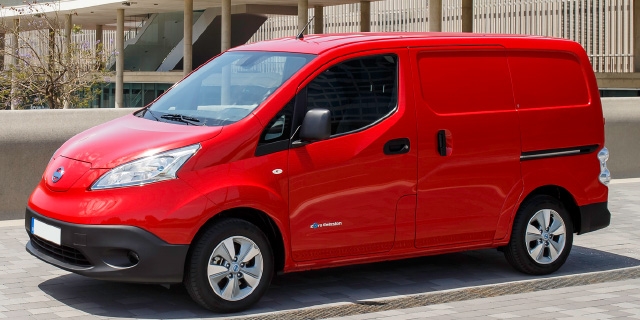Thinking of taking the plunge and buying an electric van? Here’s our guide of pros and cons.
Electric vans look set to be the next big revolution taking over our cities – along with e-bikes and e-scooters. More and more businesses are considering them as an alternative to a diesel van as a way to save money, reduce emissions and project a desirable eco-friendly image to their customers.
Electric powertrains are now available in all sizes of van, and they vary from low-range vehicles intended for last-mile deliveries to vehicles with enough battery life for a full day of long-distance driving.
As concerns about the environment – particularly within city centres – move closer to the forefront of people’s minds, battery-electric vehicles (BEVS) including vans look set to play a bigger role on UK roads. This is particularly important now that the government has set a timer on selling petrol and diesel vehicles; from 2030, the only vehicles on sale in the UK will be fully electric or plug-in hybrid (PHEV).
However, some operators still have concerns about going electric for their van fleet and/or don’t know how they can go electric with minimal compromise.
We’ve answered some of your most pressing questions about electric vans below…
How far can an electric van drive without recharging?
This number varies depending on what van you buy. Just a few short years ago, most electric vans would barely do 100 miles on a full charge – only really making them suitable for last-mile, short-range deliveries.
That began to shift in 2020, though, and through 2022 and beyond upcoming vans look set to answer the question of range once and for all.
Now, even a fairly cheap electric van such as the Renault Zoe Van can achieve up to 245 miles on a charge. Mid-sized panel vans from Citroen, Peugeot and Vauxhall have a claimed driving range of over 200 miles, which is very impressive, while vehicles such as the Ford E-Transit and Fiat E-Ducato offer this same range in a full-sized van.
How long does it take to charge an electric van?
This depends on what kind of van you have and how fast you can charge it. The slowest kind of charging is done over a regular 3-pin plug – this should give a full charge overnight for small vans, but for big vans with larger batteries as they’ll need nearly 2 days to fully charge.
A wallbox, supplied free with many electric vans and one of the most popular way to charge up, will charge most vehicles overnight, so you’ll be able to arrive each morning to a fully charged van.
Meanwhile, fast chargers, available at hundreds of sites across the country, can add as much as 80% charge in 30 minutes. However, not all chargers are this fast, and not all electric vans are even capable of using them – it’s one of the most important things to check before purchasing.
Will I save money with an electric van?
Eventually – almost definitely. The purchase price is a big stumbling block with any electric vehicle, as they’re typically much more expensive than their diesel equivalents. However, that cost should immediately begin to recoup due to the far lower cost of fuel.
If charging up overnight on an off-peak tariff, a full ‘tank’ of electricity may cost just a few pounds. The price of energy has somewhat closed the gap between this and a diesel van, though, so it is worth checking before you take the plunge.
Free road tax, reduced rates for congestion charging and, in some cases, parking also help, while electric vans also tend to have very few moving parts – in theory, making maintenance and repairs easier.
Can I get a grant?
The government’s plug-in van grant can help out with the purchase price of an electric van. As of 2022, you can claim up to £2,500 off the price of a small electric van (like the Citroen e-Berlingo or Renault Kangoo ZE) and up to £5,000 off the price of a large van (ranging in size from the mid-sized Maxus eDeliver 3 right up to the large Peugeot e-Transit).
There’s no need to apply for this grant or fill in any forms – it’s applied automatically when you purchase your van.
How clean is an electric van?
It depends on how you look at it. The good news is that as a zero-emissions vehicle, they produce nothing harmful from their daily driving.
This means they qualify for zero road tax and sidestep emissions regulations such as London’s congestion charge and ULEZ. Dodging the congestion charge alone could save companies almost £4,000 a year.
Whole-life emissions are more difficult to calculate, but it’s estimated that even with the mining necessary for the elements in the batteries and the emissions involved in generating electricity, an electric van is cleaner over its lifetime than a diesel equivalent.
Better yet, as the UK’s electricity grid moves towards more and more renewable resources, an electric van should actually become cleaner over its lifetime.
How much payload does an electric van have?
This is another sticking point, as electric vans typically offer lower payloads than their diesel counterparts.
This is due to the weight of the battery pack, which eats into the available load that the chassis can handle.
This is more of an issue with large electric vans, many of which already use up nearly all of their available weight before adding batteries. However, manufacturers are working hard on it, and many of the more recent electric vans can carry more than a ton of payload.
Electric van pros and cons
Pros
- Electric vans qualify for the government’s Plug-in Van Grant – which can hop up to £5,000 off the purchase price
- Great to drive – simple, relaxing, and quite fun
- Eco-friendly, with zero tailpipe emissions
- Save money on fuel and by ducking potential congestion charging
Cons
- Long-range vans are still very expensive to buy, and short-range ones won’t suit all drivers
- Charging – the electric charging network can be patchy and unreliable especially outside of cities
- Reduced payloads and in some cases, smaller load areas
- Batteries will eventually degrade – as they age they hold less power, although technology is always improving
Why use mustard.co.uk to insure your electric van?
Browse our van insurance page for answers to your van-related questions, we’re here to help you compare quotes to find the best policy for your needs, at a price to suit your budget.








